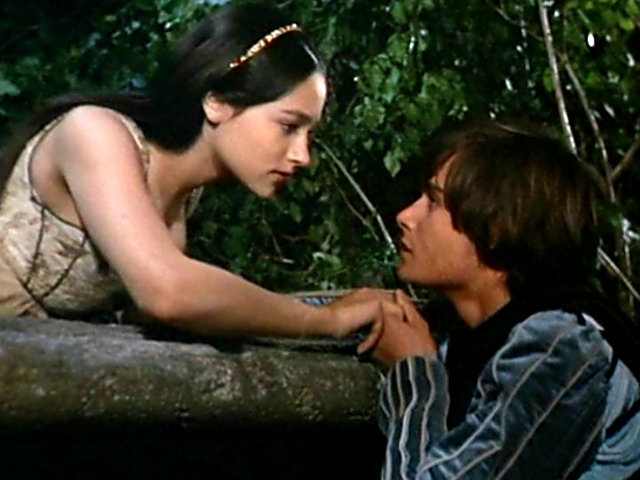

SCENE II. Capulet's orchard.
- Enter ROMEO
- ROMEO
- He jests at scars that never felt a wound.
- (JULIET appears above at a window)
- But, soft! what light through yonder window breaks?
- It is the east, and Juliet is the sun.
- Arise, fair sun, and kill the envious moon,
- Who is already sick and pale with grief,
- That thou her maid art far more fair than she:
- Be not her maid, since she is envious;
- Her vestal livery is but sick and green
- And none but fools do wear it; cast it off.
- It is my lady, O, it is my love!
- O, that she knew she were!
- She speaks yet she says nothing: what of that?
- Her eye discourses; I will answer it.
- I am too bold, 'tis not to me she speaks:
- Two of the fairest stars in all the heaven,
- Having some business, do entreat her eyes
- To twinkle in their spheres till they return.
- What if her eyes were there, they in her head?
- The brightness of her cheek would shame those stars,
- As daylight doth a lamp; her eyes in heaven
- Would through the airy region stream so bright
- That birds would sing and think it were not night.
- See, how she leans her cheek upon her hand!
- O, that I were a glove upon that hand,
- That I might touch that cheek!
- JULIET
- Ay me!
- ROMEO
- She speaks:
- O, speak again, bright angel! for thou art
- As glorious to this night, being o'er my head
- As is a winged messenger of heaven
- Unto the white-upturned wondering eyes
- Of mortals that fall back to gaze on him
- When he bestrides the lazy-pacing clouds
- And sails upon the bosom of the air.
- JULIET
- O Romeo, Romeo! wherefore art thou Romeo?
- Deny thy father and refuse thy name;
- Or, if thou wilt not, be but sworn my love,
- And I'll no longer be a Capulet.
- ROMEO
- [Aside] Shall I hear more, or shall I speak at this?
- JULIET
- 'Tis but thy name that is my enemy;
- Thou art thyself, though not a Montague.
- What's Montague? it is nor hand, nor foot,
- Nor arm, nor face, nor any other part
- Belonging to a man. O, be some other name!
- What's in a name? that which we call a rose
- By any other name would smell as sweet;
- So Romeo would, were he not Romeo call'd,
- Retain that dear perfection which he owes
- Without that title. Romeo, doff thy name,
- And for that name which is no part of thee
- Take all myself.
- ...
- ROMEO
- Lady, by yonder blessed moon I swear That tips with silver all these fruit-tree tops--
- JULIET
- O, swear not by the moon, the inconstant moon, That monthly changes in her circled orb, Lest that thy love prove likewise variable.
- ROMEO
- What shall I swear by?
- JULIET
- Do not swear at all; Or, if thou wilt, swear by thy gracious self, Which is the god of my idolatry, And I'll believe thee.
- ...
- JULIET
- A thousand times good night!
- (Exit, above)
- ROMEO
- A thousand times the worse, to want thy light.
- Love goes toward love, as schoolboys from
- their books,
- But love from love, toward school with heavy looks.
- (Retiring)
SCENE VI. Friar Laurence's cell.
- (Enter FRIAR LAURENCE and ROMEO)
- FRIAR LAURENCE
- So smile the heavens upon this holy act,
- That after hours with sorrow chide us not!
- ROMEO
- Amen, amen! but come what sorrow can,
- It cannot countervail the exchange of joy
- That one short minute gives me in her sight:
- Do thou but close our hands with holy words,
- Then love-devouring death do what he dare;
- It is enough I may but call her mine.
- FRIAR LAURENCE
- These violent delights have violent ends
- And in their triumph die, like fire and powder,
- Which as they kiss consume: the sweetest honey
- Is loathsome in his own deliciousness
- And in the taste confounds the appetite:
- Therefore love moderately; long love doth so;
- Too swift arrives as tardy as too slow.


